What To Do After 12th Class: After completing 12th grade, students are often faced with a crucial decision that can shape their careers and future prospects. With numerous options available, choosing the right course after 12th can be a daunting task. In this comprehensive guide, we will explore various career paths and top courses that can help students make an informed decision about their academic journey.
Choosing the right course after 12th is a pivotal decision that can significantly impact one’s career and personal growth. By thoroughly exploring the various course streams, understanding the curriculum, career prospects, and aligning personal interests, students can make an informed choice. Remember to consider your passion, aptitude, and long-term goals when deciding on a course. Seek guidance from professionals and take into account the changing industry trends to embark on a successful and fulfilling academic journey.
What To Do After 12th Class
Contents
Looking for the most in-demand courses after completing your 12th standard? You’re not alone in having these questions after crossing your first major milestone, the 12th board examination. We understand that these queries are common among students, but fret not, as we’re here to provide you with solutions!
Also Read: Self Introduction Tips for Students
Let’s begin by discussing the motivation behind this article. We’ve observed that pursuing medical and engineering, which are the most popular choices after completing the 12th grade, is no easy task. The competition is fierce, and you might be wondering what other options are available or what unique courses you can explore. Hence, we have compiled a list of distinctive courses that you should consider after the 12th grade.

check also : 12th Result 2024
How to Decide the what to do after 12th?
Before exploring the list of courses available for various streams after the 12th grade or discussing what to do after 12th science, it’s important to consider a few factors that will aid you in selecting the best course for you. Here’s a quick student guide to help you make informed career decisions after the 12th grade:
Deciding what to do after the 12th grade can be a significant step in your academic and professional journey. To help you make an informed decision, here are some steps you can follow:
- Self-reflection: Take some time to reflect on your interests, strengths, and aspirations. Consider what subjects or activities you genuinely enjoy and excel in. Think about your long-term goals and what career paths align with your passions.
- Research different options: Explore various career paths, courses, and industries that align with your interests. Research the educational requirements, job prospects, and growth opportunities associated with each option. Consider factors such as salary potential, job market demand, and work-life balance.
- Seek guidance: Talk to career counselors, teachers, mentors, and professionals in fields that interest you. They can provide valuable insights, guidance, and personal experiences that can help you make an informed decision. Attend career fairs, workshops, and seminars to gather information and network with industry experts.
- Consider aptitude and skills: Assess your aptitude and skills to determine the areas where you have a natural inclination or talent. Consider taking aptitude tests or career assessments to identify your strengths and match them with suitable career options.
- Evaluate future prospects: Examine the future prospects and trends in different industries. Look for fields that are growing, have a high demand for professionals, and offer potential for career advancement. Consider the potential for lifelong learning and growth in your chosen field.
- Financial considerations: Assess the financial implications of your choices. Research the costs of education, potential scholarships or financial aid, and the expected return on investment in terms of job opportunities and earning potential.
- Gain practical experience: Consider internships, part-time jobs, or volunteering opportunities in fields that interest you. Practical experience can give you a firsthand understanding of the work involved and help you make a more informed decision.
- Consult with family and friends: Seek input from your family and trusted friends. They can provide support, different perspectives, and advice that may be helpful in your decision-making process.
Remember, this decision is personal, and it’s essential to choose a path that aligns with your own interests, values, and aspirations. Take your time, gather information, and trust your instincts as you embark on this exciting phase of your academic and professional journey.
What to do after 12th Science?
Now, let’s examine some conventional and new courses that you can pursue after completing class 12 to build a successful future, regardless of whether you have studied PCM (Physics, Chemistry, Mathematics) or PCB (Physics, Chemistry, Biology) in the science stream.
After completing the 12th grade in the science stream, a crucial question arises: What to do next? The world of opportunities opens up, offering a plethora of choices to shape your future. Whether you have studied Physics, Chemistry, Mathematics (PCM) or Physics, Chemistry, Biology (PCB), this guide will help you navigate through the various paths available after 12th Science. From traditional options like engineering and medicine to emerging fields and unconventional courses, we will explore the diverse range of opportunities that can lead you to a successful and fulfilling career. So, if you’re ready to embark on an exciting journey of discovery, let’s explore what lies ahead after 12th Science!
What to do after 12th Science PCB
After completing the 12th grade in the science stream with a focus on Physics, Chemistry, and Biology (PCB), there are numerous paths you can consider to shape your future. Here are some options you can explore: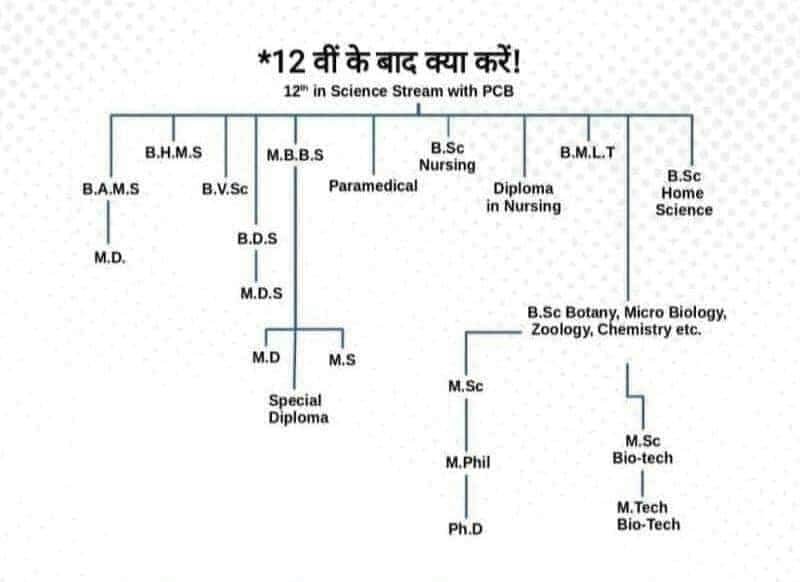
- Medicine and Allied Fields: If you have a passion for healthcare and want to become a doctor, you can pursue MBBS (Bachelor of Medicine, Bachelor of Surgery) or BDS (Bachelor of Dental Surgery). Additionally, you can explore other allied fields like Pharmacy, Nursing, Physiotherapy, Biotechnology, or Medical Laboratory Technology.
- Veterinary Science: If you have a love for animals and are interested in their well-being, you can pursue a Bachelor’s degree in Veterinary Science (B.V.Sc & A.H.) to become a veterinarian. This field offers opportunities in animal healthcare, research, and public health.
- Biotechnology: With advancements in biological sciences and technology, the field of Biotechnology offers exciting prospects. You can pursue a Bachelor’s degree in Biotechnology or Biochemistry and work in areas such as research and development, pharmaceuticals, agriculture, or genetics.
- Microbiology: If you have an interest in studying microorganisms and their impact on human health, environment, and industries, a Bachelor’s degree in Microbiology can open doors to careers in research, healthcare, quality control, or forensic science.
- Agricultural Sciences: If you have a passion for agriculture and want to contribute to food production and sustainability, you can pursue courses in Agricultural Sciences. Specializations like Agricultural Engineering, Horticulture, Agricultural Biotechnology, or Agricultural Economics offer diverse career opportunities.
- Environmental Science: If you are concerned about environmental issues and want to contribute to conservation and sustainability, you can opt for a Bachelor’s degree in Environmental Science. This field offers career prospects in environmental consultancy, research, conservation organizations, or government agencies.
- Forensic Science: If you are intrigued by crime scene investigation, forensic analysis, and solving mysteries, pursuing a Bachelor’s degree in Forensic Science can lead you to a career as a forensic scientist, crime scene investigator, or forensic analyst.
- Nutrition and Dietetics: If you have an interest in promoting healthy living through proper nutrition, you can pursue a Bachelor’s degree in Nutrition and Dietetics. This field offers opportunities in hospitals, wellness centers, sports nutrition, or research.
These are just a few options available after 12th Science PCB. It’s important to research and consider your interests, aptitudes, and long-term goals to make an informed decision. Consulting with career counselors or professionals in your chosen field can provide valuable guidance as you explore the best path for your future.
What to do after 12th Science PCM
After completing the 12th grade in the science stream with a focus on Physics, Chemistry, and Mathematics (PCM), there are several avenues you can consider to shape your future. Here are some options you can explore:
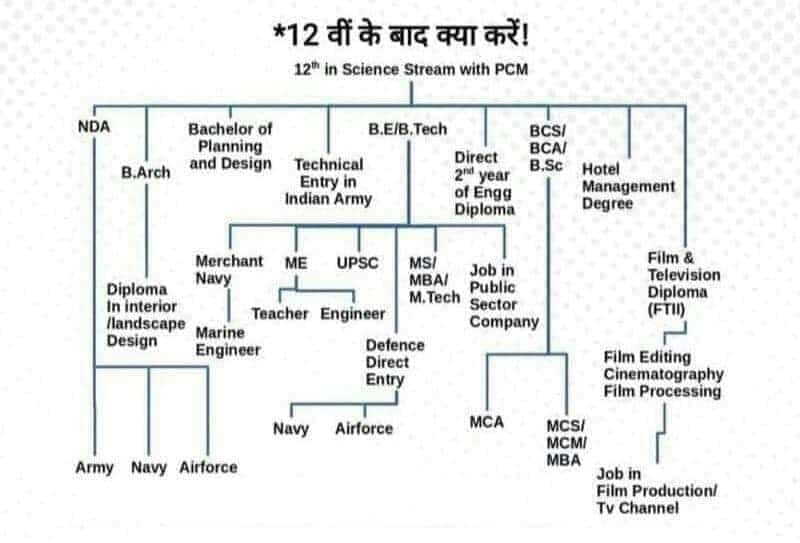
- Engineering: PCM students often choose engineering as their preferred career path. You can pursue a Bachelor’s degree in various engineering disciplines such as Civil, Mechanical, Electrical, Computer Science, Chemical, Aerospace, or Biotechnology, depending on your interests and aptitude.
- Architecture: If you have a creative flair and an interest in designing structures, pursuing a Bachelor’s degree in Architecture (B.Arch) can lead you to a career as an architect. This field involves designing and constructing buildings, exploring innovative designs, and integrating aesthetics with functionality.
- Information Technology (IT): With a strong foundation in Mathematics and Physics, PCM students can pursue a Bachelor’s degree in Information Technology or Computer Science. This field offers opportunities in software development, programming, database management, network administration, and cybersecurity.
- Data Science and Analytics: In the era of big data, a Bachelor’s degree in Data Science or Analytics can open doors to careers in data analysis, machine learning, artificial intelligence, and predictive modeling. This field involves extracting insights and patterns from vast amounts of data to drive decision-making.
- Pure Sciences: If you have a deep interest in scientific research and discovery, you can pursue Bachelor’s degrees in pure sciences such as Physics, Chemistry, Mathematics, or Applied Mathematics. These fields offer opportunities in research institutions, academia, or scientific organizations.
- Defense Services: PCM students can also consider joining the Indian Armed Forces by appearing for the National Defense Academy (NDA) entrance examination. This can lead to a career in the Army, Navy, or Air Force as an officer.
- Entrepreneurship: If you have an entrepreneurial mindset and a passion for innovation, you can explore starting your own venture. This could involve developing technological solutions, creating software applications, or launching a startup in a field aligned with your interests.
- Finance and Management: PCM students with an aptitude for numbers and analytical thinking can consider Bachelor’s degrees in Finance, Economics, or Business Administration. This can lead to careers in banking, finance, investment analysis, or management.
These are just a few options available after 12th PCM. It’s important to research and consider your interests, aptitudes, and long-term goals to make an informed decision. Consulting with career counselors or professionals in your chosen field can provide valuable guidance as you explore the best path for your future.
What to do after 12th Science PCBM
After completing the 12th grade in the science stream with a combination of Physics, Chemistry, Biology, and Mathematics (PCBM), you have a wide range of options to shape your future. Here are some paths you can consider:
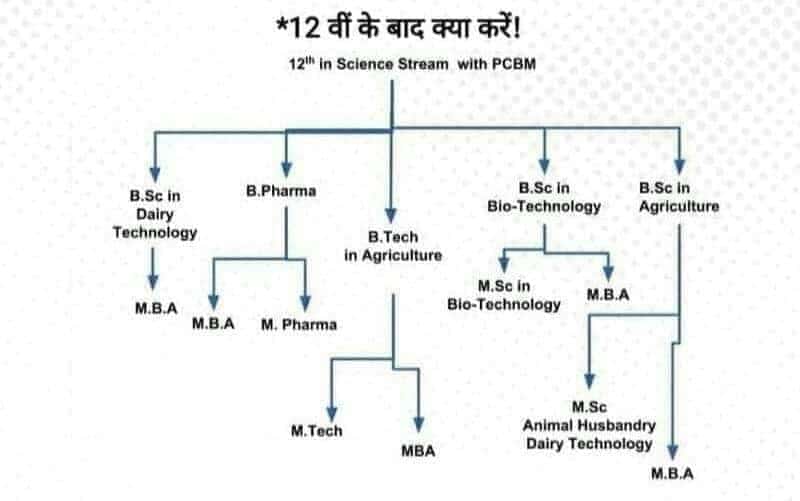
- Medicine and Allied Fields: With PCBM, you can pursue medical courses such as MBBS (Bachelor of Medicine, Bachelor of Surgery) or BDS (Bachelor of Dental Surgery) to become a doctor or dentist. Additionally, you can explore other allied fields like Pharmacy, Nursing, Physiotherapy, Biotechnology, or Medical Laboratory Technology.
- Biotechnology: PCBM students can delve into the field of Biotechnology, which involves the application of biological principles in various industries. Pursue a Bachelor’s degree in Biotechnology to work in research and development, pharmaceuticals, genetics, or agriculture.
- Agriculture and Horticulture: If you have an interest in agriculture, you can opt for courses in Agricultural Sciences or Horticulture. These fields offer opportunities in crop production, agricultural research, farm management, or agricultural engineering.
- Environmental Science: Concerned about environmental issues and sustainability? A Bachelor’s degree in Environmental Science can lead to careers in environmental consulting, conservation, research, or policy-making.
- Veterinary Science: If you have a passion for animals, consider pursuing a Bachelor’s degree in Veterinary Science (B.V.Sc & A.H.). This field offers opportunities as a veterinarian, animal researcher, or animal health professional.
- Forensic Science: With PCBM, you can explore the fascinating field of Forensic Science. It involves crime scene investigation, analysis of evidence, and forensic research. Pursue a Bachelor’s degree in Forensic Science for career prospects in forensic laboratories, law enforcement agencies, or forensic consultancy firms.
- Pure Sciences: If you have a deep interest in scientific research, you can pursue Bachelor’s degrees in pure sciences like Physics, Chemistry, Biology, or Mathematics. This can open doors to careers in research institutions, academia, or scientific organizations.
- Entrepreneurship: If you have an entrepreneurial spirit and a passion for innovation, consider starting your own venture in a field related to science and technology. This could involve developing innovative solutions, creating software applications, or launching a startup.
Remember to research and consider your interests, aptitudes, and long-term goals when making a decision. Consulting with career counselors, professionals, or subject experts can provide valuable guidance tailored to your specific interests and aspirations.
What to do after 12th Arts and Humanities?
Let’s discuss courses for those who have pursued Humanities/Arts in Class 11-12th. Note that you can also shift to these courses even if you have passed your 12th from the Science or Commerce stream.
After completing the 12th grade in the Arts and Humanities stream, you have a diverse range of options to explore for shaping your future. Here are some paths you can consider:
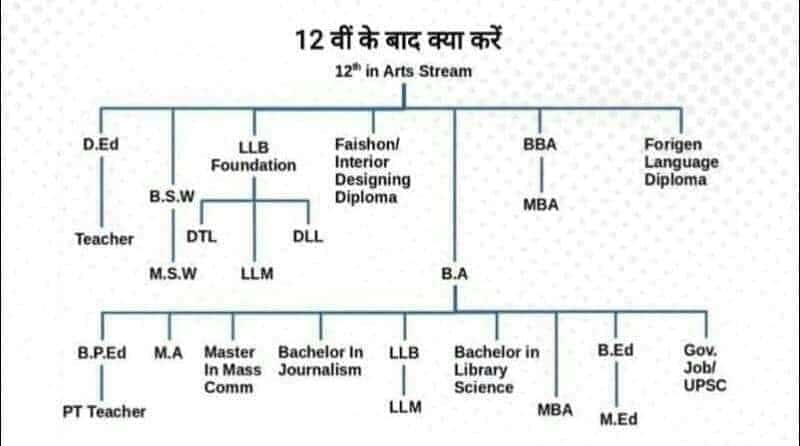
- Bachelor in Liberal Arts: This interdisciplinary program offers a broad-based education encompassing various subjects such as literature, history, philosophy, sociology, and more. It provides a well-rounded foundation for diverse career paths or further specialization.
- B.A. Economics: This program focuses on the study of economics, including topics like microeconomics, macroeconomics, economic theory, and policy. It prepares students for careers in finance, research, consulting, or government.
- B.A. Psychology: This course delves into the study of human behavior and mental processes. It equips students with knowledge in areas like cognitive psychology, abnormal psychology, developmental psychology, and counseling.
- B.A. Sociology: Sociology explores social structures, institutions, and interactions. This program examines topics such as social inequality, gender studies, social change, and research methods. It can lead to careers in social work, community development, or research.
- B.A. in Political Science: Political Science focuses on the study of political systems, governance, international relations, and public policy. It prepares students for careers in politics, government, diplomacy, journalism, or research.
- B.A. Geography: This program explores physical and human geography, environmental studies, and spatial analysis. It can lead to careers in urban planning, environmental management, GIS analysis, or cartography.
- B.A. History: This course covers historical events, cultures, and civilizations. It provides a strong foundation for careers in research, teaching, archival work, museum curation, or journalism.
These are just a few examples of the courses available for those who have pursued Humanities/Arts in Class 11-12th. It’s important to research and consider your interests, aptitudes, and long-term goals to make an informed decision. Consult with career counselors or professionals in your chosen field to receive personalized guidance.
What after 12th Commerce?
Indeed, the field of commerce offers vast career opportunities after the 12th grade. Whether you have pursued Commerce in Class 11-12th or have a science background with Mathematics, you can explore various courses and career options. Here are some examples:
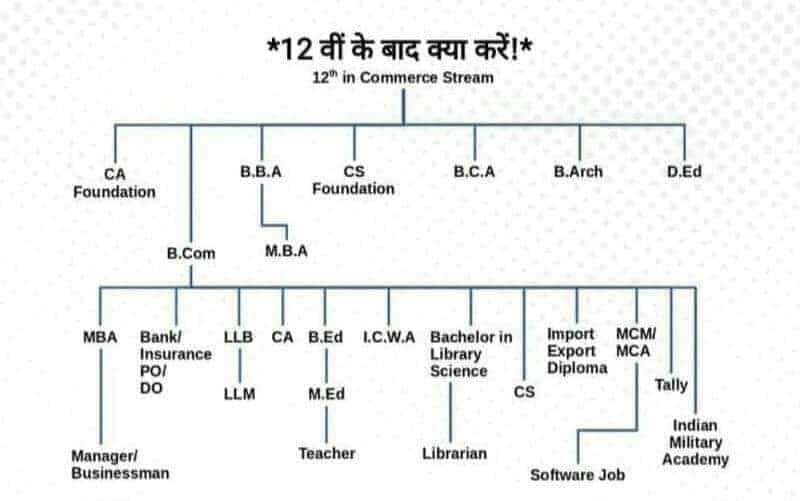
- Bachelor of Commerce (B.Com): This program provides a comprehensive understanding of commerce, accounting, finance, economics, and business management. It opens doors to careers in accounting, banking, finance, taxation, auditing, or corporate management.
- Bachelor of Business Administration (BBA): BBA focuses on the fundamentals of business management, including marketing, finance, human resources, operations, and entrepreneurship. It prepares students for entry-level managerial roles or further specialization in fields like marketing, finance, or international business.
- Chartered Accountancy (CA): CA is a professional course that equips students with knowledge and skills in accounting, auditing, taxation, and financial management. It leads to a prestigious career as a Chartered Accountant in areas like auditing, taxation, consultancy, or corporate finance.
- Company Secretary (CS): CS is a professional course that trains students in corporate laws, governance, compliance, and company management. CS professionals play a crucial role in ensuring legal and regulatory compliance within organizations.
- Cost and Management Accountancy (CMA): CMA focuses on cost accounting, financial management, strategic planning, and performance evaluation. CMAs are involved in budgeting, cost analysis, decision-making, and financial planning within organizations.
- Bachelor of Economics: This program emphasizes the study of economics, including microeconomics, macroeconomics, econometrics, and economic policy. It can lead to careers in research, financial analysis, economic consulting, or policy-making.
- Actuarial Science: Actuarial Science involves the application of mathematical and statistical methods to assess risks and uncertainties in various industries, particularly insurance and finance. Pursuing actuarial science can lead to a career as an actuary, involved in risk assessment, data analysis, and financial modeling.
- Financial Planning and Wealth Management: This field focuses on financial advisory services, investment planning, and wealth management for individuals and businesses. It involves financial analysis, risk assessment, portfolio management, and retirement planning.
These are just a few examples of the career options available after pursuing Commerce in Class 11-12th or having a science background with Mathematics. It’s important to research and consider your interests, aptitudes, and long-term goals to make an informed decision. Consult with career counselors or professionals in your chosen field for personalized guidance.
How to Choose the Perfect Course?
To filter out the perfect course for yourself among the numerous options available after the 12th grade, follow these simplified steps:
- Understand your strengths and weaknesses: Take time to identify your aptitudes, interests, and personality traits. Reflect on what you excel at and what truly motivates you. This self-awareness will guide you towards suitable career paths.
- Narrow down career clusters: Based on your self-assessment, identify a few clusters of careers that align with your strengths and interests. Focus on areas that you are genuinely passionate about and can see yourself thriving in the future.
- Explore courses for your chosen careers: Consult a student’s guide or career resources that provide information on courses after the 12th related to your chosen career clusters. Research and gather details about these courses, including their curriculum, eligibility criteria, and career prospects.
- Seek expert guidance: Consider seeking the assistance of a career expert or counselor who can provide personalized advice. They can help you navigate through the available options, analyze your strengths, and suggest suitable courses or career paths based on your unique profile.
By following this simplified process, you can make a more informed decision about the perfect course for your future. Utilize the resources available to you, including expert guidance and detailed career information, to gain clarity and choose a course that aligns with your aspirations and abilities.
Conclusion
Summing up the article, we emphasize the importance of carefully considering one’s interests and aspirations while choosing a course after 12th. By understanding the available options and seeking guidance, students can pave the way for a successful and fulfilling career.
Remember, the choice of a course after 12th should be driven by passion, aptitude, and personal goals. With the right course, students can embark on a journey of learning and growth that aligns with their aspirations and sets them on the path to a rewarding future.
Note: This article provides a general overview of the top courses after 12th and aims to guide students in making an informed decision. It is advisable to conduct thorough research, seek advice from career counselors, and consider personal interests and aptitude before finalizing a course.
FAQs
What should I consider when deciding what to do after 12th class?
When deciding what to do after 12th class, it's important to consider your interests, strengths, and long-term goals. Reflect on your passions, research different options, seek guidance from professionals, evaluate future prospects, consider aptitude and skills, assess financial considerations, gain practical experience, and consult with family and friends.
What are the options available after 12th science?
After 12th science, you can pursue various career paths. If you have studied Physics, Chemistry, Mathematics (PCM), you can consider engineering, architecture, information technology, data science, pure sciences, defense services, entrepreneurship, or finance and management. If you have studied Physics, Chemistry, Biology (PCB), you can explore medicine and allied fields, veterinary science, biotechnology, microbiology, agricultural sciences, environmental science, forensic science, or nutrition and dietetics.
What are the options available after 12th arts and humanities?
After 12th arts and humanities, you can consider pursuing a Bachelor in Liberal Arts, B.A. Economics, B.A. Psychology, B.A. Sociology, B.A. in Political Science, B.A. Geography, or B.A. History. These courses can lead to careers in diverse fields such as education, research, social work, journalism, or public administration.
What are the options available after 12th commerce?
After 12th commerce, you can explore options such as Bachelor of Commerce (B.Com), Bachelor of Business Administration (BBA), Chartered Accountancy (CA), Company Secretary (CS), Cost and Management Accountancy (CMA), Bachelor of Economics, Actuarial Science, or Financial Planning and Wealth Management. These courses can lead to careers in accounting, finance, business management, economics, or financial planning.
How can I choose the perfect course for myself?
To choose the perfect course, you can follow a simplified process. Understand your strengths and weaknesses, narrow down career clusters based on your interests, explore courses related to your chosen careers, and seek expert guidance from career counselors. By considering your aptitudes and aspirations, researching available options, and seeking advice, you can make a more informed decision about the perfect course for your future.
Related Posts
- BA Time Table
- BSC Time Table
- Bcom Time Table
- BBA Time Table
- BCA Time Table
- B.ed time table
- B.tech Time Table
- Diploma Time Table
- ITI Time Table